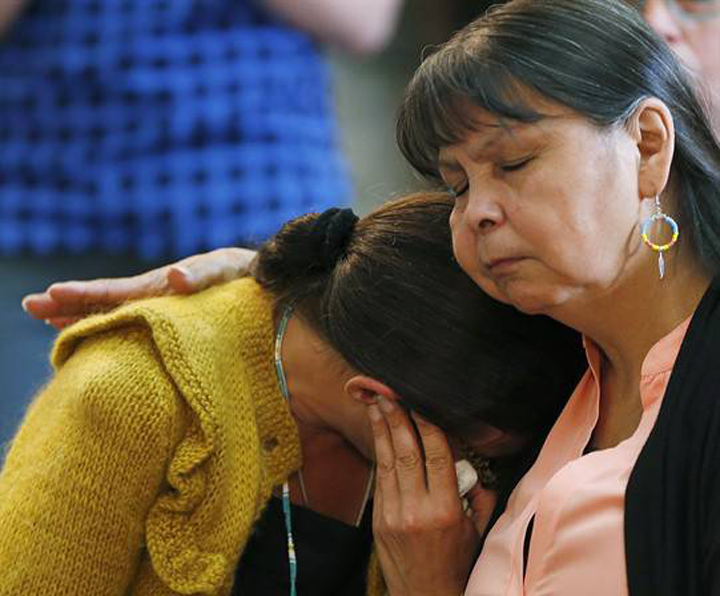A dark chapter in Canada’s past may end up costing present-day taxpayers over $1 billion as the government makes amends for what some have deemed “cultural genocide.”

On Tuesday morning, an Ontario court judge ruled in favour of the plaintiffs in a class action lawsuit linked to the Sixties Scoop.
Here’s a look at how we got to this point, what this ruling means, and what happens next.
What was the Sixties Scoop?
The name “Sixties Scoop” is a bit of a misnomer, as the forced removal of Aboriginal children from their homes and their placement with non-Aboriginal families actually occurred over two decades, between the mid-1960s and the 1980s.
In Ontario alone, it’s estimated the provincial child welfare service displaced around 16,000 Aboriginal children against the wishes of their parents.
In Manitoba, the provincial government has formally apologized to the survivors of the overtly racist policy. No formal apology for the scoop has been issued by the federal government, but Ottawa has apologized for the concurrent harm done by Canada’s residential school system.
WATCH: Manitoba government formally apologizes to aboriginal adoptees in ’60s Scoop
What is this case about?
In 2009, some of the children, now adults, affected by the policy in Ontario launched a class-action lawsuit against Ottawa, alleging that the government failed to prevent the loss of their cultural identity.
An Ojibway woman, Marcia Brown Martel, became the representative plaintiff in the class action.
What followed were years of delays as the federal government fought the claim.
READ MORE: Ontario’s top court says judges should stay out of Indian residential school claims
Last summer, the plaintiffs finally got their day in court, and their lawyers argued that they had enough evidence to forego a trial and prove that Canada had an obligation in law to ensure that indigenous children removed from their homes retain their cultural identity and heritage.
On Tuesday, Superior Court Justice Edward Belobaba ruled that, indeed, “great harm was done … The ‘scooped’ children lost contact with their families.”
That resulted in a loss of their mother tongue, culture and identity.
“Neither the children nor their foster or adoptive parents were given information about the children’s aboriginal heritage or about the various educational and other benefits that they were entitled to receive,” the ruling states.
The Chiefs of Ontario, an advocacy organization representing 133 First Nations communities in the province, called it a “landmark decision.”
“The Sixties Scoop has come to this day. This great plateau,” lead plaintiff Martel said at a news conference.
“This is a great day in Canada … what a day this is.”
Martel said that today, “Canada became a better country, one that protects the identities … of all children.”
How much money?
The lawsuit sought $85,000 for each now-grown child affected by the policy. That would total around $1.3 billion.
This is just the tip of the iceberg, however. This case could have an affect on similar legal battles being waged in other jurisdictions.
WATCH: A Sixties Scoop survivor tells her story
In Manitoba, for instance, a class-action suit linked to the Sixties Scoop has not yet been certified. It has been caught up in lengthy delays as various law firms battle to represent the plaintiffs.
Similar initial claims have also been filed on behalf of Aboriginal residents in British Columbia, Saskatchewan, Alberta, Quebec and Nova Scotia. None have been certified.
Now what?
The court must now determine the precise total of the damages owed in the Ontario suit, which will be decided at a later stage.
The federal government, meanwhile, could appeal Belobaba’s decision. But on Tuesday afternoon, Indigenous and Northern Affairs Minister Carolyn Bennett said the Liberals have “absolutely” no plans to do so.
Ottawa also recently changed tactics with respect to other suits on the horizon. Bennett told the House of Commons earlier this month that her government wants to sit down and negotiate claims arising from the scoop rather than trying to get them thrown out in court.
“Our government is determined to do this job of reconciliation,” Bennett reiterated on Tuesday.
By sitting down with survivors, Bennett explained, the government hopes to address the question of monetary compensation, but also “things that a court can’t really award.”
“It’s not just about money,” the minister said.
“Getting their language and culture back, making sure that their children will be able to speak the language and be immersed in their culture, that is hugely important.”
Bennett said she hopes to see First Nations representatives sit down with the government “by the end of the month.”




Comments